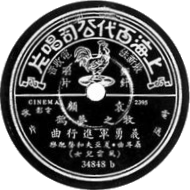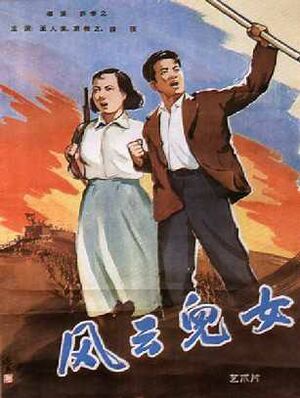مسيرة المتطوعين
إنگليزية: March of the Volunteers | |
| النشيد National | the Military anthem of the (1938–1949) |
|---|---|
| الكلمات | Tian Han, 1934 |
| الموسيقى | Nie Er, 16 May 1935 |
| تاريخ الاتخاذ | |
| عينة موسيقية | |
| March of the Volunteers | |||||||||||||||||||||||
|---|---|---|---|---|---|---|---|---|---|---|---|---|---|---|---|---|---|---|---|---|---|---|---|
| الصينية المبسطة | 义勇军进行曲 | ||||||||||||||||||||||
| الصينية التقليدية | 義勇軍進行曲 | ||||||||||||||||||||||
| هانيو پنين | Yìyǒngjūn Jìnxíngqǔ | ||||||||||||||||||||||
| المعنى الحرفي | March of the Righteous and Brave Armies | ||||||||||||||||||||||
| |||||||||||||||||||||||
| March of the Anti-Manchukuo Counter-Japan Volunteers | |||||||||||||||||||||||
| الصينية المبسطة | 反满抗日义勇军进行曲 | ||||||||||||||||||||||
| الصينية التقليدية | 反滿抗日義勇軍進行曲 | ||||||||||||||||||||||
| هانيو پنين | Fǎnmǎn Kàngrì Yìyǒngjūn Jìnxíngqǔ | ||||||||||||||||||||||
| |||||||||||||||||||||||
| National Anthem of the People's Republic of China | |||||||||||||||||||||||
| الصينية المبسطة | 中华人民共和国国歌 | ||||||||||||||||||||||
| الصينية التقليدية | 中華人民共和國國歌 | ||||||||||||||||||||||
| هانيو پنين | Zhōnghuá Rénmín Gònghéguó Guógē | ||||||||||||||||||||||
| |||||||||||||||||||||||
The "March of the Volunteers", originally titled the "March of the Anti-Manchukuo Counter-Japan Volunteers",[5][6][7] has been the official national anthem of the People's Republic of China since 1978. Unlike previous Chinese state anthems, it was written entirely in vernacular Chinese, rather than in Classical Chinese.
The Japanese invasion of Manchuria saw a boom of nationalistic arts and literature in China. This song had its lyrics written first by the communist playwright Tian Han in 1934, then set to melody by Nie Er and arranged by Aaron Avshalomov for the communist-aligned film Children of Troubled Times (1935).[8] It became a famous military song during the Second Sino-Japanese War beyond the communist faction, most notably the Nationalist general Dai Anlan designated it to be the anthem of the 200th Division, who fought in Burma. It was adopted as the PRC's provisional anthem in 1949 in place of the "Three Principles of the People" of the Republic of China (1912–1949) and the Communist "Internationale". In the Cultural Revolution, Tian Han was criticized and placed in prison, where he died in 1968. The song was briefly and unofficially replaced by "The East Is Red", then reinstated but played without lyrics, restored to official status in 1978 with altered lyrics, and finally the original version was restored in 1982.
التاريخ
| National anthems of China | ||||||||||||||||||||||
|---|---|---|---|---|---|---|---|---|---|---|---|---|---|---|---|---|---|---|---|---|---|---|
|
||||||||||||||||||||||

مناطق إدارية خاصة
اللحن
كلمات
انهضوا، يا من ترفضون العبودية
بلحمنا ودمنا
لنبن سورنا العظيم الجديد
تمر شعوب الصين بادق مراحلها
علينا جميعا ان نصرخ بتحدي
انهضوا، انهضوا، انهضوا
ملايين القلوب وفكر واحد
تحدوا نيران العدو
سيروا إلى الأمام
تحدوا نيران العدو
إلى الأمام، إلى الأمام، إلى الأمام
النسخة الأصلية
| Simplified Chinese Pinyin |
Traditional Chinese Bopomofo |
English lyrics |
|---|---|---|
|
|
Arise! Ye who refuse to be slaves! |
| IPA transcription |
|---|
[t͡ɕʰi²¹⁴ laɪ̯³⁵ pu⁵¹ ɥɛn⁵¹ t͡swɔ⁵¹ nu³⁵ li⁵¹ ti⁵¹ ʐən³⁵ mən³⁵] |
إصدار 1978-1981
| Simplified Chinese Pinyin |
Traditional Chinese Bopomofo |
English lyrics |
|---|---|---|
|
! ! |
March on! People of all heroic nationalities! |
الاختلافات
مرئيات
| ترجمة النشيد الوطني إلى اللغة العربية. |
انظر أيضاً
- Historical Chinese anthems
- Flag of the People's Republic of China
- National Emblem of the People's Republic of China
ملاحظات
- ^ Including the two Special Administrative Regions (Hong Kong and Macau)
المصادر
- ^ خطأ استشهاد: وسم
<ref>غير صحيح؛ لا نص تم توفيره للمراجع المسماةprovo - ^ خطأ استشهاد: وسم
<ref>غير صحيح؛ لا نص تم توفيره للمراجع المسماةhk - ^ خطأ استشهاد: وسم
<ref>غير صحيح؛ لا نص تم توفيره للمراجع المسماةmacao - ^ خطأ استشهاد: وسم
<ref>غير صحيح؛ لا نص تم توفيره للمراجع المسماةconstitution - ^ 曾永介 (25 ديسمبر 2012). "淺談聶耳名歌「義勇軍進行曲」". 雲南文獻. Yunnan Association of Taipei (42). Archived from the original on 14 أبريل 2021.
- ^ 曹建民 (29 أغسطس 2013). "中华人民共和国国歌的诞生源于长城抗战". Kuancheng History Museum, Hebei, China. Archived from the original on 18 أغسطس 2016.
- ^ 丛焕宇 (8 فبراير 2021). "红色桓仁是国歌原创素材地". Liaoning Daily. Archived from the original on 6 نوفمبر 2021 – via People.com.
- ^ The politics of songs: Myths and symbols in the Chinese communist war music, 1937–1949. CT Hung. Modern Asian Studies, 1996.
- ^ 《電通半月畫報》 [Diantong Pictorial], No. 1 (16 May) or No. 2 (1 June). Diantong Film Co. (Shanghai), 1935.
وصلات خارجية
- 中华人民共和国国歌 (in Chinese (China)). Government of the People's Republic of China.
- National Anthem of the People's Republic of China (EN)
- Official instrumental version, hosted by the People's Republic of China
- Semi-official vocal version, hosted by the China Internet Information Center
- "March of the Volunteers" at National Anthems
| سبقه Three Principles of the People (1943–1949 in the Mainland and since 1949 in Taiwan) |
March of the Volunteers 1949–present |
تبعه Incumbent |
| سبقه God Save the Queen (until Transfer of sovereignty over Hong Kong) |
March of the Volunteers 1997–present |
تبعه Incumbent |
| سبقه A Portuguesa (until Transfer of sovereignty over Macau) |
March of the Volunteers 1999–present |
تبعه Incumbent |
- Pages with plain IPA
- Articles containing صينية-language text
- Short description is different from Wikidata
- Articles with hatnote templates targeting a nonexistent page
- Missing redirects
- Use dmy dates from December 2021
- Articles containing إنگليزية-language text
- Pages using Lang-xx templates
- Articles with hAudio microformats
- Flagdeco with missing country data templates
- CS1 uses الصينية-language script (zh)
- CS1 Chinese (China)-language sources (zh-cn)
- أناشيد وطنية
- Asian anthems
- National symbols of the People's Republic of China
- 1935 songs
- Chinese patriotic songs
- Chinese military marches
- مقالات تحتوي مقاطع ڤيديو
- National anthems
- Songs written for films
- National anthem compositions in G major
- أغان مكتوبة للأفلام
- أغاني 1935
- أناشيد دول آسيا الوطنية
- رموز الصين الوطنية




